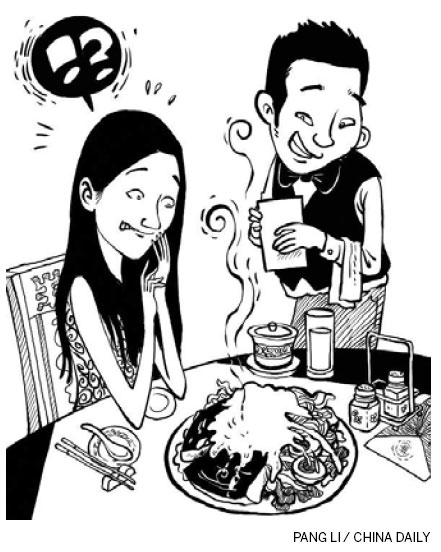
During my two weeks in the United States, I often found myself sitting in a Chinese restaurant, gazing blankly at a glossy menu.
I was traveling across the East Coast, and after more than a week, had gorged on my fill of fries, burgers and tacos. I found myself having startlingly vivid and frequent dreams of bowls of steaming rice and realized I desperately needed to be satiated by something from the motherland.
There are more Chinese restaurants in the US than McDonald's, Burger Kings, KFCs and Wendy's combined. So naturally, when I was in Philadelphia, I had a huge selection to choose from. "Tastes of the Orient", "Wok and Roll" and similar ingeniously named restaurants were scattered throughout the city.
I walked into one restaurant expecting to be overwhelmed with familiar names and nostalgic aromas. How wrong I was.
Tell me please, what is the Chinese equivalent of General Tso's chicken? I know nothing of General Tso, let alone his deep-fried, garlic-smothered chicken. And what is chop suey? Moo shoo pork? Never in my life have I seen such a rich and varied array of sweet-and-sour dishes and something-and-broccoli combinations.
The transformation of Chinese food in America, from its introduction in the 1800s by immigrants from Guangdong province to present-day Chinese fast-food chains, is mind-boggling.
Ming Tsai, the owner of Blue Ginger restaurant in Wellesley, Massachusetts, remarked that Chinese-American cuisine, essentially, is dumbed-down Chinese food. It's adapted for the wrong reasons, to be blander, thicker and sweeter for the American public".
I couldn't have agreed more. Darting in and out of Chinese restaurants throughout my stay in New England, a basic formula began to become apparent: take the fattest pork you can get, cook it in a lot of oil with the sweetest mixture, throw on a lot of cheap soy sauce, thicken the sauce to a glue-like texture and then serve the dish.
Take General Tso's chicken, a dish ubiquitous on all Chinese-American menus. It is sweet and fried and it is chicken - all the things that Americans love.
And then of course, I must mention one of the most bizarre of all Chinese-American culinary phenomena - chop suey, a dish of pork or beef, eggs and stir-fried noodles, cooked quickly with vegetables in a starch-thickened sauce.
Before I went to the US, I knew nothing of chop suey. The average native of any city in China knows nothing of chop suey. My friends in Guangzhou, where chop suey is supposed have originated, know nothing of chop suey.
Literally, it means za sui in Chinese, or "odds and ends". So an American accustomed to the cuisine back at Charlie Chan's, Dallas, Texas, who walks around Beijing asking for chop suey, is the equivalent of a Chinese person walking around New York saying, "Hey, I've heard of a really famous dish here. It's called leftovers".
And finally, there is the great enigma of the fortune cookie - a thin, folded wafer and a slip of paper that contains my "fortune". Never have I been offered one of these crispy biscuits in Beijing. Recently, I watched with amusement, a compilation of videos on YouTube, where Chinese were given fortune cookies. They poked and prodded the packages of cookies with bemused expressions, taking wary bites as if sampling an exotic fruit. Upon discovering the "fortune", one person remarked, "I've won a prize!"
This ignorance, however, is completely understandable. Fortune cookies actually originated in Kyoto, Japan, and then were popularized by the Chinese-American community in the 1940s. Ironically though, when I inspected my fortune cookie package, it said in small letters - "Made in China".
But then again, we are living in a rapidly globalizing world. Times are changing. There's Walmart in Beijing. There's Starbucks in Ningxia. There's H&M and Zara at every street corner. Apparently, Panda Express, a Chinese-American fast food chain, notorious for its starch-filled delicacies, is planning to expand to China.
Would it be possible then, that in a few years time, right here, in Beijing, at a bistro in Sanlitun Beilu, or strolling through Wangfujing Dajie, I'll be happily munching away on chop suey and fortune cookies?
